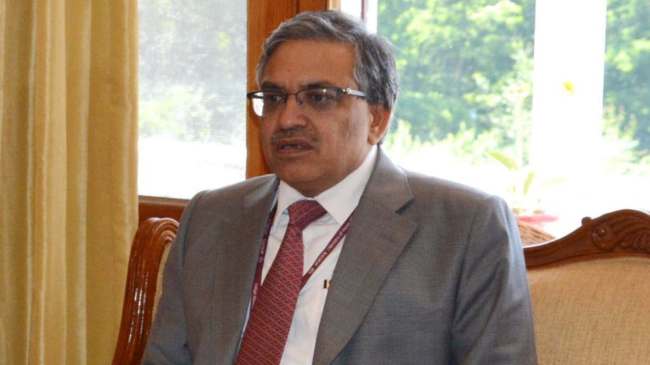Power, Polls and Pressure: Why CEC Gyanesh Kumar’s “SIR” is Rocking Indian Democracy

Image via The Indian Express
New Delhi, August 28, 2025 — The Election Commission of India (ECI) is once again in the spotlight. At the center of this storm is Chief Election Commissioner (CEC) Gyanesh Kumar. He is the first top poll official to take charge under the new 2023 law, which changed the way the CEC is appointed. This law gave the government greater control, removing the Chief Justice of India from the selection panel. Since then, Kumar has been driving what he calls “EC 2.0.” But with controversies building around the Special Intensive Revision (SIR) exercise in Bihar, the question arises — for whom do the polls toll under his leadership?
Who is Gyanesh Kumar?
Gyanesh Kumar is a 1988-batch IAS officer of the Kerala cadre. He is not new to sensitive political assignments. In the past, he worked on issues linked to Jammu and Kashmir, including the abrogation of Article 370. He also played a role in setting up the Shri Ram Janmabhoomi Teerth Kshetra Trust after the Ayodhya verdict. These experiences made him a trusted name for the government.
When he became the Chief Election Commissioner in March 2025, it was seen as a turning point. For the first time, the appointment came under the new law. Critics felt the government had too much say in the process. Supporters argued that Kumar’s administrative record and firm decision-making would help strengthen the election system.
The Big Idea: EC 2.0
After taking charge, Kumar announced a new vision. He called it “EC 2.0.” This meant a stronger, faster, and more tech-driven Election Commission.
Some of his major steps included:
- Introducing biometric attendance for staff to ensure accountability.
- Transferring over 10 state chief electoral officers within just six months.
- Expanding social media presence of the EC to counter fake news quickly.
- Stressing on voter awareness campaigns using digital tools.
Kumar argued these changes were needed to restore public trust in elections. But critics saw it as too much central control, with little consultation with states or parties.
The Spark: Special Intensive Revision in Bihar
The turning point came with the Special Intensive Revision (SIR) launched in Bihar. For the first time, new voters were asked to provide proof of citizenship before being added to the electoral rolls. The EC said this was to clean up voter lists. But opposition parties saw it as a move to delete genuine voters and reduce their vote banks.
The controversy deepened when the EC published a list of 6.5 million deleted voters from Bihar’s electoral rolls. What shocked many was the speed. The list was uploaded within 56 hours of a Supreme Court order asking for transparency. Critics said the EC was rushing, leaving little time for people to respond. The Commission gave a deadline of September 1 for filing objections, adding more fuel to the debate.
Opposition Strikes Back
The INDIA bloc — which includes the Congress, TMC, DMK, RJD, and Left parties — has accused the EC of becoming a “B-team” of the ruling party. Leaders even hinted at pushing for an impeachment motion against Gyanesh Kumar. They argued that democracy cannot survive if the Election Commission is seen as biased.
Public rallies in Bihar grew louder, with slogans of “vote chori” (vote theft) filling the air. Opposition leaders claimed that lakhs of poor and marginalized voters had been unfairly struck off the rolls.
Clash With Rahul Gandhi
The biggest face-off has been with Congress leader Rahul Gandhi. During his Voter Adhikar Yatra in Bihar, Rahul accused the EC of “stealing votes.” He said the SIR process was designed to deny ordinary people their democratic rights.
In reply, Gyanesh Kumar took a firm stand. He told Rahul Gandhi to either submit an affidavit in court or apologize to the nation. According to him, wild allegations without proof were damaging the credibility of the Election Commission. He warned that the EC would take a tough position against attempts to mislead voters.
The EC’s Defense
Despite all the criticism, Kumar has defended the EC’s decisions strongly. He points out that India has one of the most rigorous voter list systems in the world. Every voter list is shared openly with political parties. Booth agents, polling officers, and observers are present at every stage.
He explained that during elections, more than 1 crore officials, 20 lakh polling agents, and 10 lakh booth agents take part. With such a vast structure, he argued, it is impossible to carry out mass manipulation. The EC, he said, is committed to transparency and fairness.
Why This Matters
The fight over SIR and voter lists is not just about Bihar. It goes to the heart of India’s democracy. Voter rolls are the foundation of free and fair elections. If people lose trust in them, the entire system can collapse.
For Gyanesh Kumar, the stakes are high. He has branded himself as the face of a “new EC.” But the opposition is determined to paint him as biased. With elections in several states around the corner, and the Lok Sabha polls not far away, every move of the EC will be closely watched.
Key Highlights at a Glance
- CEC Appointment: Gyanesh Kumar is the first CEC chosen under the new 2023 law.
- EC 2.0 Vision: Biometric attendance, mass transfers, stronger digital outreach.
- Bihar SIR: Citizenship proof demanded for new voters, sparking protests.
- Voter List Shock: 6.5 million names deleted, uploaded within 56 hours of SC order.
- Opposition Fire: INDIA bloc alleges bias, hints at impeachment.
- Rahul vs Kumar: Rahul accuses EC of “vote theft.” Kumar demands affidavit or apology.
- EC’s Stand: Claims India has the most transparent voter roll system in the world.